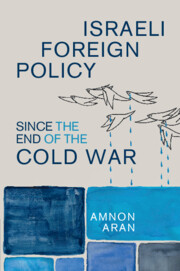Book contents
- Israeli Foreign Policy since the End of the Cold War
- Cambridge Middle East Studies
- Israeli Foreign Policy since the End of the Cold War
- Copyright page
- Dedication
- Contents
- Maps
- Figures
- Acknowledgements
- Chronology
- Abbreviations
- Maps
- Introduction
- 1 Entrenchment
- 2 Redirection
- 3 On the Brink of Peace?
- 4 Engagement Incomplete
- 5 Engagement under Assault
- 6 The Dividends of Engagement
- 7 Unpicking the Oslo Accords
- 8 Backtracking
- 9 Just Beyond Reach
- 10 Between Engagement and Unilateralism
- 11 In Search of a Foreign Policy Paradigm
- 12 A Perfect Storm
- 13 The Road Map for Regime Change
- 14 The Resurgence of Unilateralism
- 15 Events Dear Boy, Events
- 16 The End of the Road
- 17 Vulnerable Ties
- Epilogue: Israel’s Wondrous Decade?
- Appendix List of Persons Interviewed
- References
- Index
- Books in the Series
17 - Vulnerable Ties
Published online by Cambridge University Press: 15 December 2020
- Israeli Foreign Policy since the End of the Cold War
- Cambridge Middle East Studies
- Israeli Foreign Policy since the End of the Cold War
- Copyright page
- Dedication
- Contents
- Maps
- Figures
- Acknowledgements
- Chronology
- Abbreviations
- Maps
- Introduction
- 1 Entrenchment
- 2 Redirection
- 3 On the Brink of Peace?
- 4 Engagement Incomplete
- 5 Engagement under Assault
- 6 The Dividends of Engagement
- 7 Unpicking the Oslo Accords
- 8 Backtracking
- 9 Just Beyond Reach
- 10 Between Engagement and Unilateralism
- 11 In Search of a Foreign Policy Paradigm
- 12 A Perfect Storm
- 13 The Road Map for Regime Change
- 14 The Resurgence of Unilateralism
- 15 Events Dear Boy, Events
- 16 The End of the Road
- 17 Vulnerable Ties
- Epilogue: Israel’s Wondrous Decade?
- Appendix List of Persons Interviewed
- References
- Index
- Books in the Series
Summary
Chapter 17 provides the first analysis of the causes and consequences shaping Israel’s foreign policy towards established and emerging powers beyond the Middle East two decades after the end of the Cold War. The chapter identifies two contradicting trends in Israel’s foreign policy towards China, India, the EU, and the USA. On the one hand, the economic ties with all four countries had deepened and expanded significantly. On the other, Israel’s foreign policy towards all four power remains vulnerable to different degrees. In the case of the USA and EU, the deepening Israeli occupation of the Palestinians poses a normative threat to the long-term endurance of these relationships. As far as Israel-China and Israel-India ties are concerned, they are contingent on these powers’ economic interests in Arab Gulf States - and to a lesser extent Iran - and their burgeoning ties with Israel remaining compartmentalized.
- Type
- Chapter
- Information
- Israeli Foreign Policy since the End of the Cold War , pp. 366 - 386Publisher: Cambridge University PressPrint publication year: 2020

